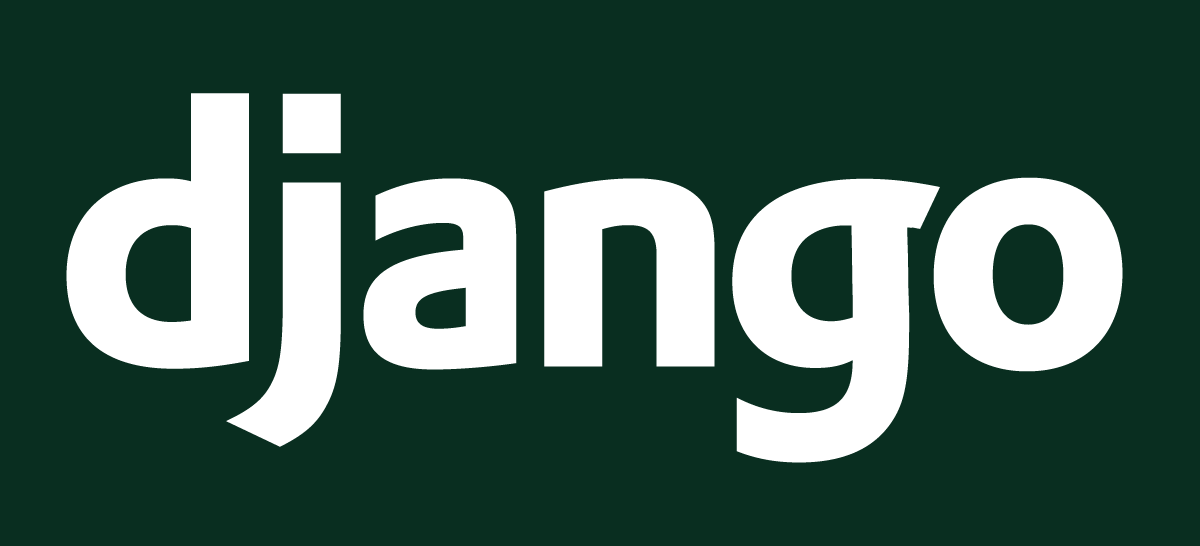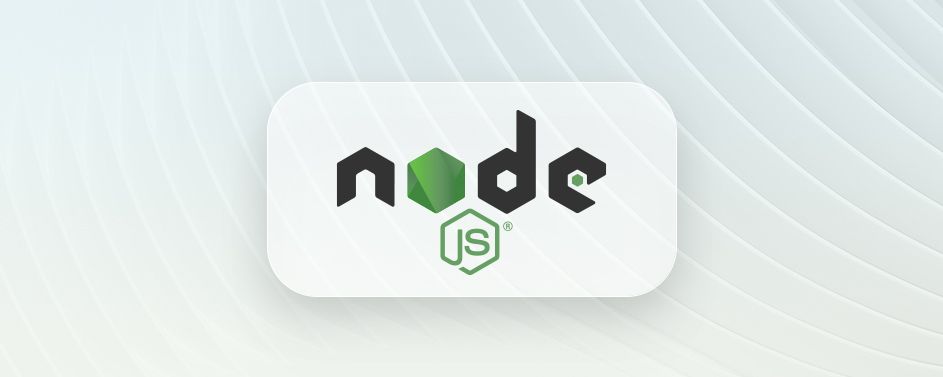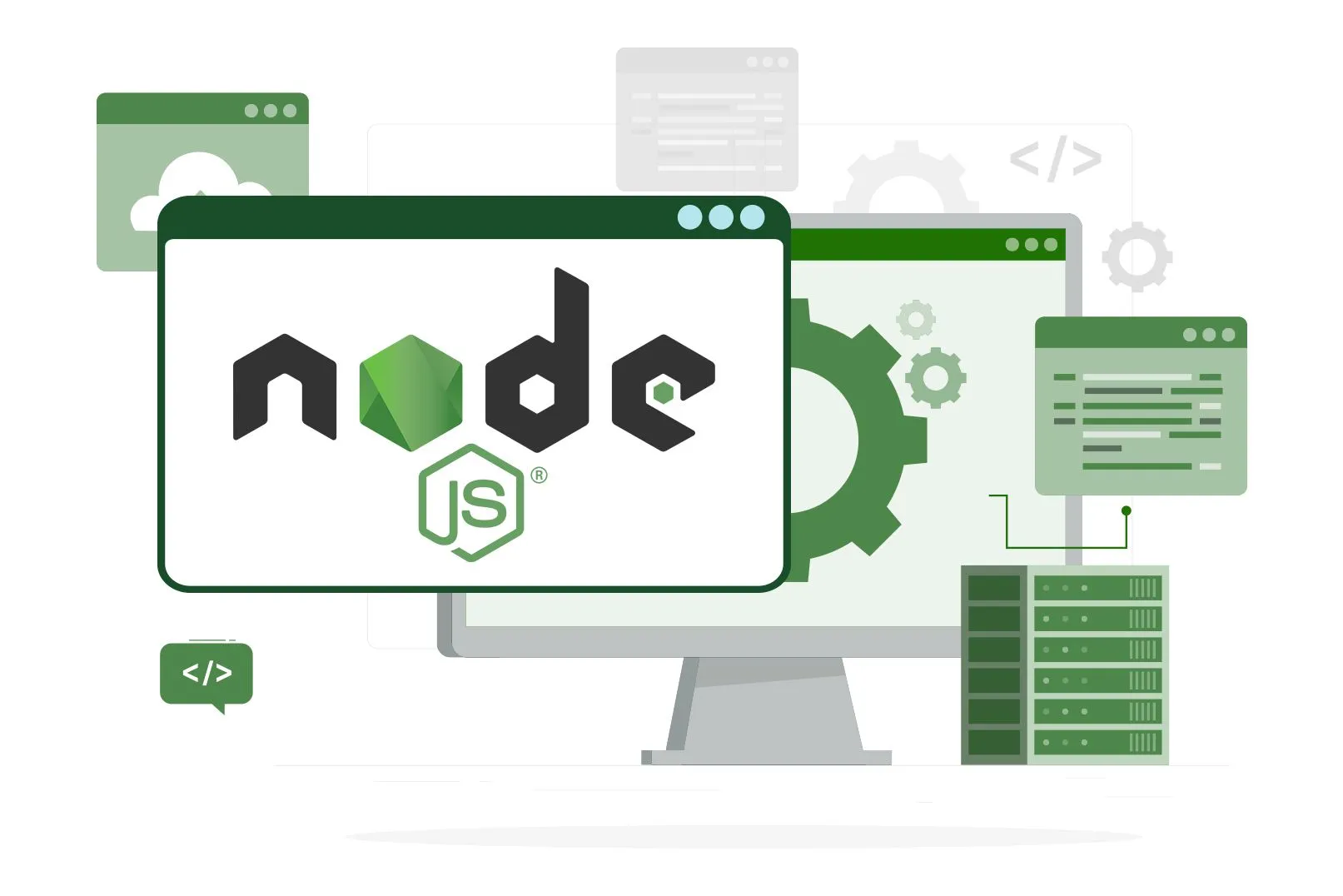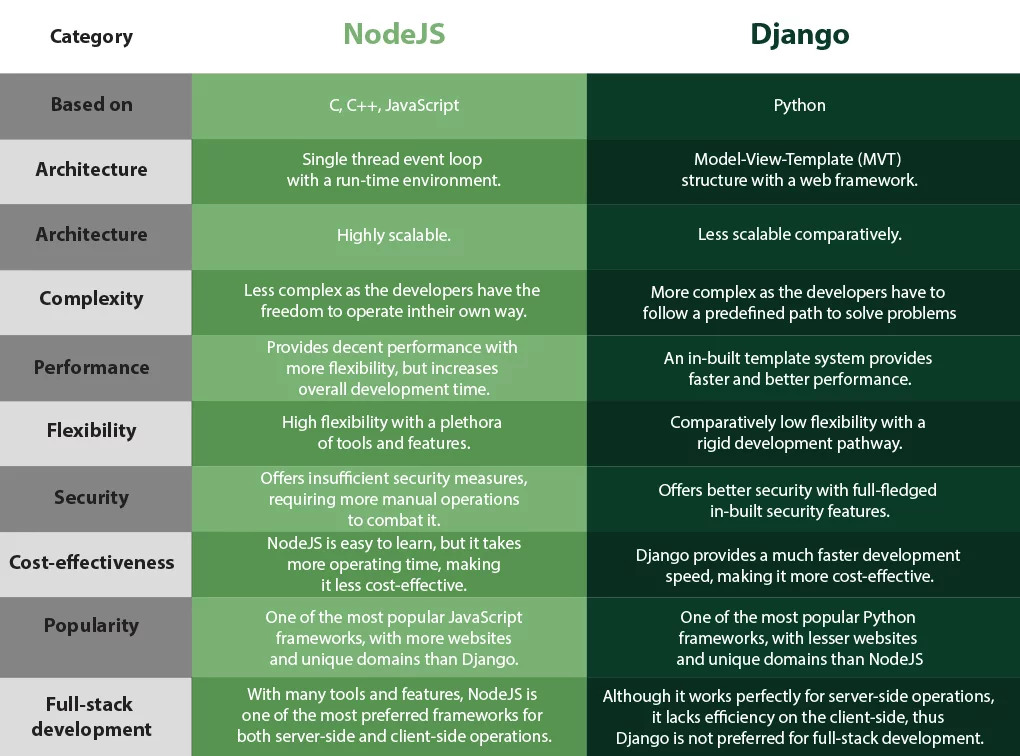Both Django and Node.js are prominent technologies in the realm of web development, offering versatility and power to create scalable web applications. Django, a high-level Python framework, streamlines development with its rapid prototyping capabilities. On the other hand, Node.js, an open-source JavaScript runtime environment that functions across platforms, has seen a surge in popularity for both web and mobile app development in recent years. With both options boasting efficiency and versatility, the key question becomes: django vs node.js, which one reigns supreme for your upcoming web development project?
This guide delves into a comparison of these two dynamic technologies to equip you with the knowledge required to make an informed decision based on your specific needs. Let’s embark on a journey to understand the fundamental features of each framework.
What is Django?
Django is a high-level web development framework built on the Python programming language. First created in the mid-2000s, it’s matured into a powerful and versatile toolkit that streamlines the development process. Django emphasizes speed and security, allowing developers to build complex websites efficiently. A 2023 survey of Python developers ranked Django as the second-most popular framework within the Python community. This widespread adoption is further bolstered by an active community of developers and comprehensive documentation, ensuring that help is readily available throughout the development cycle. Now that we’ve explored the core aspects of Django, let’s delve into its various use cases.
Uses of Django
Django’s versatility makes it a popular framework for a wide range of web development projects. Here are some of its common applications:
- Cross-Platform Applications: Django streamlines development for applications that need to function seamlessly across different devices and operating systems.
- Minimum Viable Product (MVP) Development: The framework’s rapid development capabilities make it ideal for creating MVPs, allowing you to test and validate your concept efficiently.
- Enterprise Application Development: Django’s robust features and scalability empower businesses to build complex enterprise applications that can handle demanding workloads.
- Scalable Web Applications: As your user base grows, Django can easily adapt to accommodate increased traffic and data demands, ensuring your application remains performant.
- Secure E-commerce Platforms: Django prioritizes security, making it a trustworthy choice for building e-commerce platforms that handle sensitive user information and financial transactions.
These are just a few examples, highlighting Django’s adaptability for various project needs. Whether you’re a large organization or a budding startup, Django offers a powerful foundation to bring your web development vision to life.
Advantages of Django
Django’s popularity among web developers stems from its collection of advantages. Here are some of the key benefits that make Django a compelling choice for your next project:
- Scalability and Versatility: Django excels at handling growing user bases and complex web applications. Its well-structured design allows developers to build applications that can adapt and expand seamlessly as your needs evolve.
- Robust Security: Security is paramount in today’s digital landscape. Django prioritizes security by incorporating features like user authentication, authorization, and protection against common web vulnerabilities. This built-in focus on security gives developers a strong foundation to create safe and reliable web applications.
- Code Maintainability: Django adheres to the principles of DRY (Don’t Repeat Yourself) and KISS (Keep It Short and Simple). This promotes code reusability and promotes clean, concise code that’s easier to maintain and update in the future. This not only simplifies the development process but also reduces the potential for errors and maintenance headaches down the road.
- Built-in Features for Rapid Development: Django boasts a comprehensive set of built-in features that streamline the development process. This includes functionalities for user authentication, database management, URL routing, and more. These features empower developers to focus on core application logic and deliver projects efficiently.
By combining these advantages, Django empowers developers to create secure, scalable, and feature-rich web applications with efficient development cycles.
Popular Companies Using Django
Django’s robust features and secure architecture have attracted a wide range of well-known companies. Some notable examples include:
- Social Media: Instagram allows users to share photos and videos seamlessly, a functionality well-suited to Django’s ability to handle high traffic volumes.
- Media and Content Creation: National Geographic utilizes Django to power its website, delivering rich content and engaging user experiences to a global audience.
- Music Streaming: Spotify leverages Django’s scalability to provide a smooth and personalized music streaming experience for millions of users.
- Visual Discovery: Pinterest utilizes Django’s efficient content management capabilities to allow users to discover and share visual inspirations.
- Presentation Software: Prezi utilizes Django’s framework to create a dynamic and interactive presentation platform.
This is just a glimpse into the diverse range of companies that have successfully implemented Django for their web development projects. Now, let’s delve into Node.js, another popular framework, to understand its strengths and how it compares to Django.
What is Node.js?
Node.js is an open-source server environment that shines in building scalable web applications. Launched in 2009 by Ryan Dahl, it has become a popular choice for millions of websites (over 30 million according to W3Techs). A key advantage of Node.js is its extensive library of pre-built JavaScript modules, which streamline the development process. Additionally, Node.js empowers developers to create RESTful APIs, a foundational element for building modern web applications. With its versatility and ease of use, Node.js offers a compelling solution for a wide range of web development needs, which we’ll explore in the next section.
Uses of Node.js
Node.js shines in a variety of web development applications. Here are some of the areas where Node.js excels:
- Data Streaming Applications: Node.js’s asynchronous nature makes it ideal for real-time data streaming applications. It can efficiently handle large data flows without compromising performance.
- Single-Page Applications (SPAs): Node.js is a strong back-end partner for SPAs, which rely heavily on data exchange between the client and server. Node.js excels at handling these interactions smoothly.
- Social Media Applications: The real-time and interactive nature of social media applications aligns perfectly with Node.js’s capabilities. It can efficiently manage user interactions, data updates, and push notifications.
- Virtual Emulators: Node.js can be used to create virtual environments that mimic real-world systems. This allows for testing and development in a simulated setting.
- JSON API-based Applications: Node.js excels at building APIs that use JSON (JavaScript Object Notation) for data exchange. JSON APIs are lightweight and efficient, making them a popular choice for modern web applications.
- I/O Bound Applications: Applications that involve a high volume of input/output (I/O) operations can benefit from Node.js’s non-blocking I/O model. This allows Node.js to handle multiple requests simultaneously, leading to improved responsiveness.
By leveraging these strengths, Node.js can be a powerful tool for building a wide range of dynamic and scalable web applications.
Advantages of Using Node.js
Node.js offers several advantages that make it a compelling choice for web development projects. Here are some of its main advantages in further detail:
- Enhanced Efficiency and Scalability: Node.js excels at handling a high volume of concurrent requests efficiently. This translates to a smoother user experience for your web application, especially as your user base grows. Furthermore, Node.js applications can be readily scaled to accommodate increasing traffic demands.
- High Flexibility: Node.js boasts a vast ecosystem of open-source libraries and extensions. This extensive toolkit empowers developers to find pre-built solutions for various functionalities, saving development time and resources. Additionally, Node.js allows developers to leverage JavaScript throughout the development process, from frontend to backend, streamlining the development workflow.
- Mature and Well-Tested: Node.js has been around for over a decade, with a large and active developer community. This maturity translates to a stable and well-tested framework, reducing the risk of encountering unforeseen issues during development.
- Asynchronous Programming: Node.js utilizes an asynchronous programming model, allowing it to handle multiple requests simultaneously without compromising performance. This efficient approach ensures a responsive user experience even when dealing with high traffic volumes.
In summary, Node.js’s combination of efficiency, scalability, flexibility, and mature development environment make it a powerful tool for building modern web applications.
Popular Companies Using Django
Django’s robust features and streamlined development process have attracted a wide range of well-known companies across various industries. These giants leverage Django’s capabilities to create and maintain complex web applications efficiently. Some notable examples include:
- Social Media Powerhouses: Django empowers social networking platforms like LinkedIn to connect millions of users and manage vast amounts of data seamlessly.
- Entertainment Industry Leaders: Streaming giant Netflix utilizes Django to deliver exceptional user experiences with its extensive library of movies and shows.
- Financial Technology Innovators: PayPal, a leader in online payments, relies on Django’s security features and scalability to handle secure financial transactions.
- E-commerce Giants: Walmart, a household name in retail, leverages Django’s power to drive its online store, ensuring a smooth shopping experience for millions of customers.
- Content Creation Platforms: Medium, a popular platform for online publishing, utilizes Django to support a thriving community of writers and readers.
This is just a glimpse into the extensive list of companies that have embraced Django for their web development needs. Its flexibility, security, and developer-friendly nature make it a compelling choice for businesses of all sizes.
Django vs Node.js: A Head-to-Head Comparison
With a solid understanding of Django and Node.js’ core functionalities, let’s delve deeper and explore their key differences. This comparison will help you determine which framework is better suited for your specific web development project.
Choosing the Right Framework for Your Project
Both Django and Node.js are popular choices for web development, each boasting a broad range of applications. There’s no one-size-fits-all answer to which reigns supreme; the ideal framework hinges entirely on your project’s specific requirements.
For instance, if building a high-performance and stable application is your priority, Django might be the stronger contender. Conversely, if your project demands heavy client-side processing, Node.js could be a better fit. Carefully analyze your web development needs to make an informed decision and select the framework that best empowers you to achieve your project goals.
Conclusion
Both Django and Node.js are powerful frameworks that can streamline web development. Each offers distinct advantages and functionalities, making the ideal choice dependent on your specific project requirements.
Feeling indecisive? Don’t hesitate to reach out to the expert developers at ONextDigital. We’ll carefully assess your project needs and help you navigate the decision-making process to determine which framework best aligns with your vision. Contact us today and get started on the path to a successful web development project!









